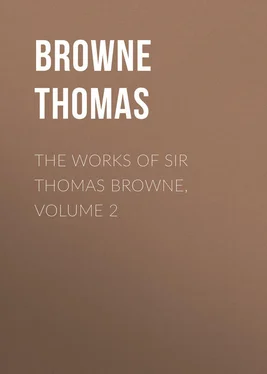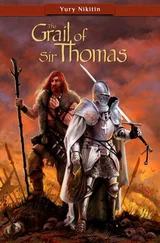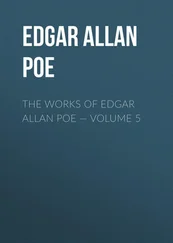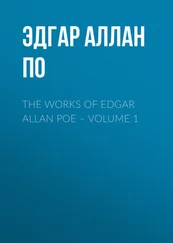Thomas Browne - The Works of Sir Thomas Browne, Volume 2
Здесь есть возможность читать онлайн «Thomas Browne - The Works of Sir Thomas Browne, Volume 2» — ознакомительный отрывок электронной книги совершенно бесплатно, а после прочтения отрывка купить полную версию. В некоторых случаях можно слушать аудио, скачать через торрент в формате fb2 и присутствует краткое содержание. ISBN: , Жанр: foreign_antique, foreign_prose, на английском языке. Описание произведения, (предисловие) а так же отзывы посетителей доступны на портале библиотеки ЛибКат.
- Название:The Works of Sir Thomas Browne, Volume 2
- Автор:
- Жанр:
- Год:неизвестен
- ISBN:http://www.gutenberg.org/ebooks/39961
- Рейтинг книги:5 / 5. Голосов: 1
-
Избранное:Добавить в избранное
- Отзывы:
-
Ваша оценка:
- 100
- 1
- 2
- 3
- 4
- 5
The Works of Sir Thomas Browne, Volume 2: краткое содержание, описание и аннотация
Предлагаем к чтению аннотацию, описание, краткое содержание или предисловие (зависит от того, что написал сам автор книги «The Works of Sir Thomas Browne, Volume 2»). Если вы не нашли необходимую информацию о книге — напишите в комментариях, мы постараемся отыскать её.
The Works of Sir Thomas Browne, Volume 2 — читать онлайн ознакомительный отрывок
Ниже представлен текст книги, разбитый по страницам. Система сохранения места последней прочитанной страницы, позволяет с удобством читать онлайн бесплатно книгу «The Works of Sir Thomas Browne, Volume 2», без необходимости каждый раз заново искать на чём Вы остановились. Поставьте закладку, и сможете в любой момент перейти на страницу, на которой закончили чтение.
Интервал:
Закладка:
That they have two eyes is the common opinion, but if they have two eyes, we may grant them to have no less than four, that is, two in the larger extensions above, and two in the shorter and lesser horns below, and this number may be allowed in these inferiour and exanguious animals; since we may observe the articulate and latticed eyes in Flies, and nine in some Spiders: And in the great Phalangium Spider of America , we plainly number eight.
But in sanguineous animals, quadrupeds, bipeds, or man, no such number can be regularly verified, or multiplicity of eyes confirmed. And therefore what hath been under this kind delivered, concerning the plurality, paucity or anomalous situation of eyes, is either monstrous, fabulous, or under things never seen includes good sense or meaning. And so may we receive the figment of Argus , who was an Hieroglyphick of heaven, in those centuries of eyes expressing the stars; and their alternate wakings, the vicissitude of day and night. Which strictly taken cannot be admitted; for the subject of sleep is not the eye, but the common sense, which once asleep, all eyes must be at rest. And therefore what is delivered as an Embleme of vigilancy, that the Hare and Lion do sleep with one eye open, doth not evince they are any more awake then if they were both closed. For the open eye beholds in sleep no more then that which is closed; and no more one eye in them then two in other Animals that sleep with both open; as some by disease, and others naturally which have no eye-lids at all.
How things happen to be seen as double.
As for Polyphemus, although the story be fabulous, the monstrosity is not impossible. For the act of Vision may be performed with one eye; and in the deception and fallacy of sight, hath this advantage of two, that it beholds not objects double, or sees two things for one. For this doth happen when the axis of the visive cones, diffused from the object, fall not upon the same plane; but that which is conveyed into one eye, is more depressed or elevated then that which enters the other. So if beholding a Candle, we protrude either upward or downward the pupill of one eye, the object will appear double; but if we shut the other eye, and behold it with one, it will their appear but single; and if we abduce the eye unto either corner, the object will not duplicate: for in that position the axis of the cones remain in the same plane, as is demonstrated in the opticks, and delivered by Galen , in his tenth De usu partium .
Relations also there are of men that could make themselves invisible, which belongs not to this discourse: but may serve as notable expressions of wise and prudent men, who so contrive their affairs, that although their actions be manifest, their designs are not discoverable. In this acception there is nothing left of doubt, and Giges Ring remaineth still amongst us: for vulgar eyes behold no more of wise men then doth the Sun: they may discover their exteriour and outward ways, but their interiour and inward pieces he only sees, that sees into their beings.
CHAPTER XXI
Of the Chameleon
Concerning the Chameleon there generally passeth an opinion that it liveth only upon air, and is sustained by no other aliment: Thus much is in plain terms affirmed by Solinus , Pliny , and others, and by this periphrasis is the same described by Ovid . All which notwithstanding, upon enquiry I find the assertion mainly controvertible, and very much to fail in the three inducements of belief.
And first for its verity, although asserted by some, and traditionally delivered by others, yet is it very questionable. For beside Ælian , who is seldom defective in these accounts; Aristotle distinctly treating hereof, hath made no mention of this remarkable propriety: which either suspecting its verity, or presuming its falsity, he surely omitted: for that he remained ignorant of this account it is not easily conceiveable: it being the common opinion, and generally received by all men. Some have positively denied it, as Augustinus , Niphus , Stobæus , Dalechampius , Fortunius Licetus , with many more; others have experimentally refuted it, as namely Johannes Landius , who in the relation of Scaliger , observed a Chameleon to lick up a fly from his breast: But Bellonius Comment. in Ocell. Lucan. hath been more satisfactorily experimental, not only affirming they feed on Flies, Caterpillars, Beetles and other Insects, but upon exenteration he found these Animals in their bellies: whereto we might also add the experimental decisions of the worthy Peireschius and learned Emanuel Vizzanius , in that Chameleon which had been often observed to drink water, and delight to feed on Meal-worms. And although we have not had the advantage of our own observation, yet have we received the like confirmation from many ocular spectators.
As touching the verisimility or probable truth of this relation, several reasons there are which seem to overthrow it. For first, there are found in this Animal, the guts, the stomack, and other parts official unto nutrition; which were its aliment the empty reception of air, their provisions had been superfluous. Now the wisdom of nature abhorring superfluities, and effecting nothing in vain, unto the intention of these operations, respectively contriveth the Organs; and therefore where we find such Instruments, we may with strictness expect their actions; and where we discover them not, we may with safety conclude the non-intention of their operations. So when we perceive that Bats have teats, it is not unreasonable to infer they suckle their younglings with milk; but whereas no other flying Animal hath these parts, we cannot from them expect a viviparous exclusion; but either a generation of eggs, or some vermiparous separation, whose navel is within it self at first, and its nutrition after not connexedly depending of its original.
Again, Nature is so far from leaving any one part without its proper action, that she oft-times imposeth two or three labours upon one, so the Pizel in Animals is both official unto Urine and to generation, but the first and primary use is generation; for some creatures enjoy that part which urine not. So the nostrils are useful both for respiration and smelling, but the principal use is smelling; for many have nostrils which have no lungs, as fishes, but none have lungs or respiration, which have not some shew, or some analogy of nostrils. Nature provides no part without its proper function or office. Thus we perceive the providence of Nature, that is, the wisdom of God, which disposeth of no part in vain, and some parts unto two or three uses, will not provide any without the execution of its proper office, nor where there is no digestion to be made, make any parts inservient to that intention.
Beside the remarkable teeth, the tongue of this animal is a second argument to overthrow this airy nutrication: and that not only in its proper nature, but also its peculiar figure. For of this part properly taken there are two ends; that is, the formation of the voice, and the execution of tast; for the voice, it can have no office in Chameleons , for they are mute Animals; as beside fishes, are most other sorts of Lizards. As for their tast, if their nutriment be air, neither can it be an Instrument thereof; for the body of that element is ingustible, void of all sapidity, and without any action of the tongue, is by the rough artery or wezon conducted into the lungs. And therefore Pliny much forgets the strictness of his assertion, when he alloweth excrements unto that Animal, that feedeth only upon Air; which notwithstanding with the urine of an Ass, he commends as a magicall Medicine upon our enemies.
Читать дальшеИнтервал:
Закладка:
Похожие книги на «The Works of Sir Thomas Browne, Volume 2»
Представляем Вашему вниманию похожие книги на «The Works of Sir Thomas Browne, Volume 2» списком для выбора. Мы отобрали схожую по названию и смыслу литературу в надежде предоставить читателям больше вариантов отыскать новые, интересные, ещё непрочитанные произведения.
Обсуждение, отзывы о книге «The Works of Sir Thomas Browne, Volume 2» и просто собственные мнения читателей. Оставьте ваши комментарии, напишите, что Вы думаете о произведении, его смысле или главных героях. Укажите что конкретно понравилось, а что нет, и почему Вы так считаете.












